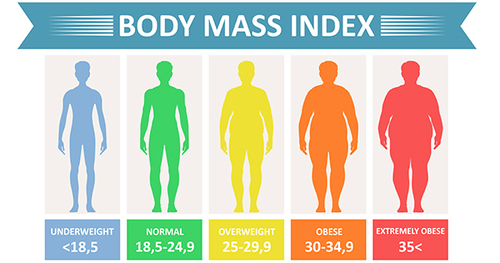

A person with a BMI of 25 to 29.9 is considered to be overweight, and someone with a BMI over 30 is considered to be obese
A BMI of 30 and higher is considered obese. The higher the BMI, the greater the risk of developing additional health
problems. A healthy weight is considered to be a BMI of 24 or less. A BMI of 25 to 29.9 is considered overweight.
Assessing Your Weight and Health Risk
Assessment of weight and health risk involves using three key measures:
Body mass index (BMI)
Waist circumference
Risk factors for diseases and conditions associated with obesity
Body Mass Index (BMI)
BMI is a useful measure of overweight and obesity. It is calculated from your height and weight. BMI is an estimate of body fat and a good gauge of your risk for diseases that can occur with more body fat. The higher your BMI, the higher your risk for certain diseases such as heart disease, high blood pressure, type 2 diabetes, gallstones, breathing problems, and certain cancers.
Although BMI can be used for most men and women, it does have some limits:
It may overestimate body fat in athletes and others who have a muscular build.
It may underestimate body fat in older persons and others who have lost muscle.
Waist Circumference
Measuring waist circumference helps screen for possible health risks that come with overweight and obesity. If most of your fat is around your waist rather than at your hips, you’re at a higher risk for heart disease and type 2 diabetes. This risk goes up with a waist size that is greater than 35 inches for women or greater than 40 inches for men. To correctly measure your waist, stand and place a tape measure around your middle, just above your hipbones. Measure your waist just after you breathe out.
The table Risks of Obesity-Associated Diseases by BMI and Waist Circumference provides you with an idea of whether your BMI combined with your waist circumference increases your risk for developing obesity-associated diseases or conditions.
Risk Factors for Health Topics Associated With Obesity
Along with being overweight or obese, the following conditions will put you at greater risk for heart disease and other conditions:
Risk Factors
High blood pressure (hypertension)
High LDL cholesterol ("bad" cholesterol)
Low HDL cholesterol ("good" cholesterol)
High triglycerides
High blood glucose (sugar)
Family history of premature heart disease
Physical inactivity
Cigarette smoking
For people who are considered obese (BMI greater than or equal to 30) or those who are overweight (BMI of 25 to 29.9) and have two or more risk factors, it is recommended that you lose weight. Even a small weight loss (between 5 and 10 percent of your current weight) will help lower your risk of developing diseases associated with obesity. People who are overweight, do not have a high waist measurement, and have fewer than two risk factors may need to prevent further weight gain rather than lose weight.
Talk to your doctor to see whether you are at an increased risk and whether you should lose weight. Your doctor will evaluate your BMI, waist measurement, and other risk factors for heart disease.
The good news is even a small weight loss (between 5 and 10 percent of your current weight) will help lower your risk of developing those diseases.
Aim for a Healthy Weight
